Sustainable Pathways for Precious Metals Recovery: Key discussions from the PEACOC Cluster Event
Efficient recovery processes of Precious Metals from European end-of-life resources with novel technologies – Event proceedings
The PEACOC cluster workshop titled “Efficient recovery processes of Precious Metals from European end-of-life resources with novel technologies” was held as part of the GOING GREEN CARE INNOVATION conference on 09 May 2023 in Vienna (Austria). The event featured three other EU-funded projects, namely FIREFLY, PHEIDIAS, and LYDIA, all working on the recovery of precious metals (PMs) from end-of-life (EoL) products. The motivation behind the launch of these projects stems from the limitations of current technologies used in PMs recycling. These limitations include high investment costs, significant energy consumption, a high environmental footprint resulting from either the burning of materials with pyrometallurgy or the use of strong acidic solutions with hydrometallurgy processes, and negative impacts on both human health and the environment. Therefore, the European research community aims to develop and scale up more sustainable solutions to address the urgent need for securing a PMs supply for European industries.
With a clear aim to address the limitations of current recycling technologies for PMs, the workshop delivered an in-depth overview of the most promising technologies developed by the European researchers. These technological advancements have potential to efficiently and sustainably recover PMs at high rates.
The event proceeded with a series of presentations, beginning with Nader AKIL, Operations and Business Development representative from PNO Innovation (Belgium), who set out the tone of the workshop, presenting the context of the PEACOC project, its concept, but also the recycling opportunities where the PEACOC project has potential to bring added value. Backed by 19 partners from 9 countries, including 14 companies, 2 research centres, and 3 universities, the PEACOC project aims to develop and demonstrate a first-of-a-kind economically and environmentally viable pre-commercial metallurgical system for recovering PMs from a wide variety of EoL products in Europe.
The precious metals targeted within the PEACOC project are Platinum Group Metals (PGMs), gold (Au) and silver (Ag). Acknowledging their importance due to their unique physicochemical properties, such as low corrosiveness, catalytic properties, low electrical resistivity, PGMs are strategic minerals listed as critical raw materials (CRMs) by the European Commission. Driven by their use in autocatalysts and chemical processes, the demand of PGMs in Europe is high, while the current domestic production is insignificant. Trends indicate that the PGMs market is under high stress characterised by record-high prices and an unbalanced relation between supply and demand of PGMs. The recycling input rate of EoL products containing PGMs in Europe is estimated at only 21%, which is insufficient to meet the EU demand. On the other hand, Au is now listed as a conflict material by the EU, and imports must ensure compliance with sustainable sourcing of this resource. EU production currently accounts for less than 1% of global primary production. Although challenging, the recycling of gold from low/mid-grade PCBAs represents an unexploited potential in Europe. Silver (Ag) is extensively used in photovoltaic (PV) production, with the EU accounting for approximately 7% of global primary production. The EU already recycles around 37% of the world’s silver, and significant potential for Ag recycling has been identified from EoL PV panels and PCBAs.
Painting a concerning background for the revolution towards climate neutrality of the European industry, the need to develop and scale up sustainable solutions for PMs recycling becomes a reality that needs to be addressed with urgency.
Download PEACOC general presentation
Unlocking value in low-grade PCBAs
The workshop continued with presentations highlighting specific technologies for PMs upconcentration in EoL products that will be upscaled within the PEACOC project. Paul ANDRÉ, researcher at the University of Liege (Belgium), introduced the NOVA technology initially developed in collaboration with COMET Traitements (Belgium) as part of the Reverse Metallurgy project, and effectively tested within the PEACOC framework. This innovative technology combines electrochemistry and mechanical activation to unlock the value of PMs, tin (Sn), and copper (Cu). Paul André discussed the presence of different metals in PCBAs and categorized PCBAs based on their intrinsic value, including high-grade PCBAs, mid-grade PCBAs, and low-grade PCBAs.
Researchers from the University of Liege focused on designing and improving processes to make better use of mid and low-grade PCBAs, which are typically sent outside of Europe due to low interest from smelters. The NOVA process yields three main outputs: depopulated PCBAs, electronic components, and tin (Sn) concentrate. Most of the PMs can be found in the electronic component fraction. The electronic components extracted by the NOVA process will then move on to the sorting technologies and magnetic density separation (MDS) developed by TU Delft (The Netherlands) for further concentration.
Download presentation Unlocking value in low-grade PCBAs
Microwave-assisted leaching of PGMs from EoL autocatalysts
Frantisek Kukurugya, a researcher within the Sustainable Materials Management unit at the VITO Research Centre (Belgium), provided a brief introduction to the research centre before diving into the application of microwave (MW) radiation in hydrometallurgy. He explained the advantages of microwave-assisted leaching, including fast heating resulting in shorter processing time, direct and selective volumetric heating, and electrification of metallurgical processes.
The research team at VITO is currently focused on optimising the process for extraction of (PGMs) from spent autocatalysts, aiming to build a pilot capable of treating 5-10 kg/hour in collaboration with CEINNMAT (Spain). The optimisation process revolves around four main aspects: reducing hydrochloric acid (HCl) consumption, optimising the addition of the oxidising agent and the reaction temperature, and refine the liquid-to-solid (L/S) ratio.
The test results have shown that the concentration of HCl and reaction time can be significantly reduced while maintaining high PGM (i.e. Pt, Pd and Rh) extraction (≥90%). Furthermore, the process does not require an oxidizing agent. The possibility of recirculating the leaching solution has also been proven. Thus, the microwave-assisted leaching process of PGMs from spent automotive catalysts is now all set for upscaling. Based on the results obtained by VITO at lab scale, CEINNMAT is currently building a pilot-scale microwave reactor system to further advance the technology.
With the process for the extraction of PGMs from autocatalysts already optimised at laboratory scale, VITO are now shifting towards other waste materials aiming to recover Ag and Au.
Gas-diffusion electrocrystallisation
The PEACOC project aims to implement the innovative gas-diffusion electrocristallisation (GDEx) process, presented by Luis F. LEON-FERNANDEZ, a researcher at VITO. GDEx is an electrochemical process of reactive precipitation of metals in solution with oxidising or reducing agents produced in-situ by the electrochemical reduction of a gas, in a gas-diffusion electrode. As a sustainable electrochemical process, GDEx will be applied during the recovery and refining stages of the PEACOC project, following the physical pretreatment and MWAL leaching. Its primary purpose is to selectively convert low-grade precious group metals from complex PGM-bearing liquid streams, such as leachates, into upcycled products that can be reintegrated into the PGMs value chain.
The European Commission has recognised GDEx as an excellent EU-funded innovation for PGM recovery, and VITO holds the patent for this ground-breaking technology. Applied to different industrial streams, GDEx proved its effectiveness for direct PGM recovery from synthetic solutions and synthesis of metallic nanoparticles. Notably, the experimental work conducted on GDEx has resulted in a scientific publication in the RCS Sustainability Journal titled “Synthesis of platinum group metal nanoparticles assisted by CO2 reduction and H2 cogeneration at gas-diffusion electrodes.”, and a second scientific paper recently accepted in Electrochimica Acta – “Mechanism and kinetics of gold recovery and Au nanoparticle synthesis by Gas-Diffusion Electrocrystallisation (GDEx)“.
During the presentation, Luis F. unveiled the blueprint for the pre-commercial pilot, offering the audience an exclusive first look. The engineering process is currently under development, with the aim of operating at a nominal flow rate of 100 L/h. The pilot installation and testing are scheduled to take place next year in Greece, specifically on the premises of MONOLITHOS.
Download the GDEx presentation
Selective recovery of PGMs from spent autocatalysts using DES
During the PEACOC cluster event, Dra. Maria Ibañez from TECNALIA (Spain) introduced an innovative approach for the selective recovery of PGMs from spent autocatalysts using Deep Eutectic Solvents (DES). Classified as types of ionic solvents, DES exhibit unique properties, particularly their significantly lower melting point compared to the individual components. DES used in this selective recovery process consist of a eutectic mixture of two components: a hydrogen bond donor (HBD) and a hydrogen bond acceptor (HBA). They offer several advantageous properties, including easy preparation, low-cost precursors, biodegradability, recyclability, non-flammability, excellent solvent and reaction media characteristics, and the ability to act as a selective solvent.
Using DES, the research team at TECNALIA achieved the selective recovery of PGMs from solid residues of spent catalysts (i.e., 95% purity). The resulting precipitate contained a mixture of Palladium (Pd, 67%), Platinum (Pt, 27%), and Rhodium (Rh, 1%). By adjusting different operational parameters, the researchers reported efficient and selective recovery of PGMs. Additionally, they reported several advantages observed during the experimental work, including the utilisation of benign chemicals, the reuse of reagents for seven cycles with similar extraction yields of PGMs, and improvements in mass, energy, space, and time efficiency. TECNALIA has submitted a patent for this innovative technology, showcasing its potential for commercial application in the recovery of PGMs from spent autocatalysts.
In addition to the DES-based selective recovery, the research team from TECNALIA also evaluated the electroleaching (ELX) process as a means to electrify the DES leaching process for the direct recovery of PGMs from solid residues in a single reactor, without the need for oxidising agents. TECNALIA has submitted another patent for this electrification technology, which further enhances the sustainability and efficiency of the PGM recovery process.
Dowload the presentation Selective recovery of PGMs from spent autocatalyst using DESs
FIREFLY Horizon Europe project
After presenting the progress achieved by the innovative technologies developed within the PEACOC project framework, Savitha Thayumanasundaram, researcher at VITO, gave a brief introduction of the recently launched FIREFLY project, listing the motivation lying behind this research initiative, but also the concept and the specific objectives.
Backed by a consortium group counting eight research centres, six SMEs, and two large enterprises, the project sets out to build upon the existing momentum of power-to-chemicals and pioneer a power-to-catalysts trajectory, with the vision of making catalyst recycling electrochemical. This includes an experimental, modelling, optimisation and engineering approach, as well as the efficient integration of renewable electricity. The project will boost its competitiveness by implementing artificial intelligence tools for predicting best-processing routes. As the project coordinator, Xochitl Dominguez Benetton emphasised in the project’s first press release, “The FIREFLY project is a landmark example of integrated research efforts in sustainable chemistry, sustainable materials and sustainable energy, shaping a vision on technology for a better world.”
For more detailed information about the project, its concept, consortium composition, and expected impact, interested individuals can visit the project’s website at https://www.firefly-project.eu/.
Download the FIREFLY presentation
Recovering PGMs from automotive Catalysts and Fuel Cell/Electrolysers using universal hydrometallurgical process
The PEACOC cluster event concluded with two presentations showcasing EIT Raw Materials upscaling projects: PHEIDIAS and LYDIA, delivered by Iakovos Yakoumis, the Founder and Managing Partner of MONOLITHOS Catalysts and Recycling Ltd (Greece). The presentation titled “Recovering Platinum Group Metals from automotive Catalysts and Fuel Cell/Electrolysers using a universal hydrometallurgical process” began with an overview of the primary uses of PGMs and an analysis of the growing demand for these precious metals driven by the manufacturing of hybrid cars, fuel cells, and electrolysers.
PHEIDIAS introduces an innovative hydrometallurgical recycling system for PGMs recovery based on an industrial process that primarily utilises spent catalysts, some of which are nearly 20 years old. The novelty of the process lies in sorting the catalysts based on their metal content and subjecting batches of similar catalysts (such as those containing Pt) to the leaching process. This single-step process eliminates the need for pre-processing, enabling the catalysts to be directly introduced into the leaching solution. The result is a high Pt recovery yield of approx. 99%. Conditions will be further optimised in large-scale reactors (1000L), and MONOLITHOS will continue conducting real-condition tests to validate the hydrometallurgical system.
Launched in January 2023, the LYDIA project is predominantly composed of a consortium from the industry sector. The project’s objective is to commercialise low-cost components for hydrogen applications, specifically fuel cells and electrolysers, by recycling end-of-life membrane electrode assemblies (MEAs) and extracting PGMs. To produce new electrocatalysts using spent catalysts from MEAs, the research team has adopted a novel hydrometallurgical process developed by MONOLITHOS. This in-house method has already achieved high recovery rates of over 99% for Pt and over 60% for Iridium (Ir) from end-of-life fuel cell electric vehicles (FCEVs) and electrolysers’ MEAs, which contain significant concentrations of PGMs.
The conference in numbers
The cluster event organised by the PEACOC project, in collaboration with FIREFLY, PHEIDIAS and LYDIA, was part of the GOING GREEN – CARE INNOVATION conference that attracted a diverse range of stakeholders. Overall, the main conference featured no less than 141 presentations grouped in 24 workshop sessions and counted on the participation of more than 320 participants. The conference was predominantly attended by representatives of the industry, such as producers, recycling companies (approximately 60% of the overall attendance), while participants from the academic sector accounted for almost 33%. More than 70% of the audience attended the CARE INNOVATION conference on site, and, from a geographical perspective, the audience was dominated by participants from Austria (13%), Germany (12,7%), Belgium (9,7%), but also from Japan (8%) and USA (7,3%).
The cluster event was organised in a hybrid format and featured more than 40 attendees on site and online. The event was recorded for the conference participants and for the other interested stakeholders that were not able to join the cluster session due to overlapping parallel sessions.
The PEACOC cluster event brought together projects focused on the recovery of PMs from EoL products using sustainable technologies. The presentations highlighted the importance of developing more sustainable solutions due to the limitations of current PMs recycling solutions. With the implementation of these cutting-edge technologies developed by research projects, Europe holds great promise for revolutionising the recovery and refining of PMs, contributing to a more sustainable and efficient approach to metal resource utilisation. Not only do these research initiatives contribute to the circular economy, but they also have the potential to reduce reliance on primary PMs resources, ensuring a more sustainable and efficient supply chain for these critical metals to European industries.
Photo gallery
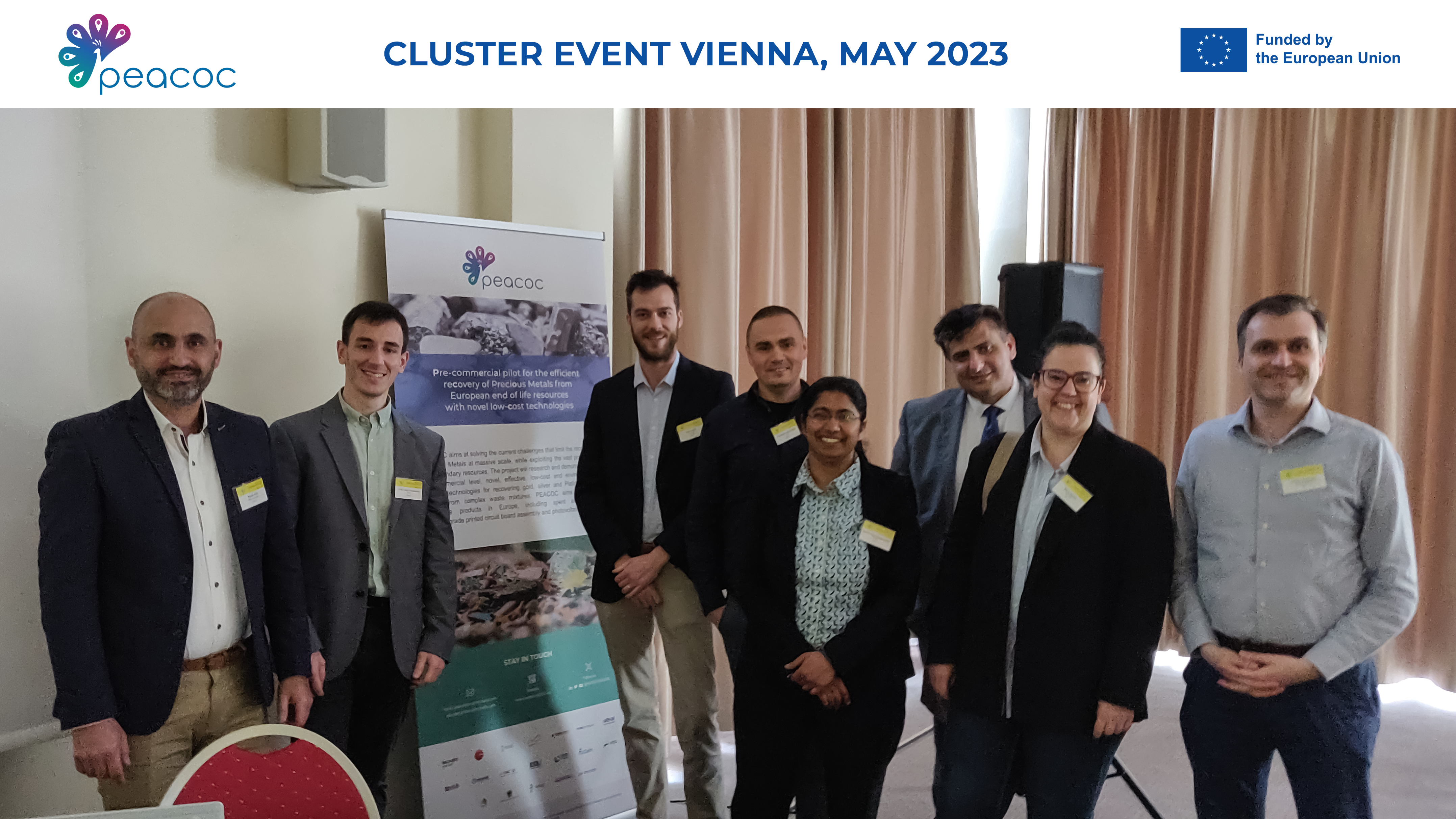
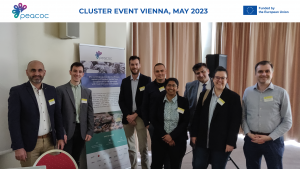
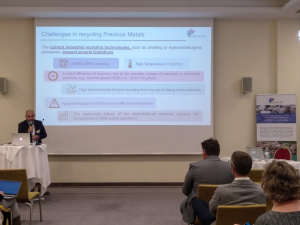
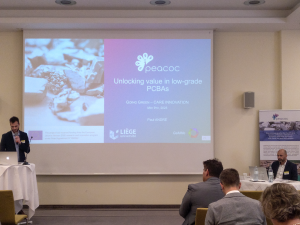
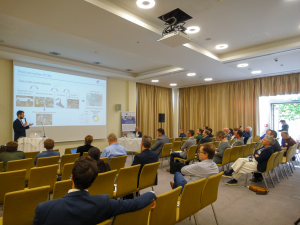
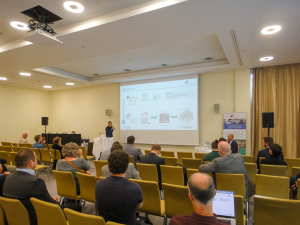
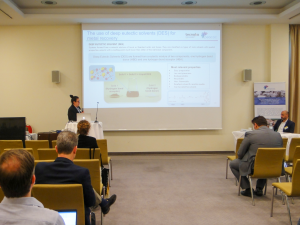
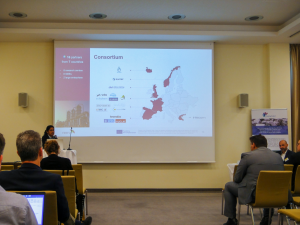
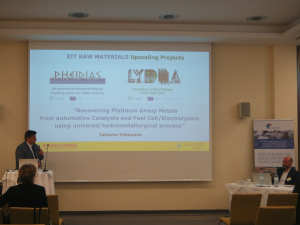
 This
project has received funding from the European Union’s
Horizon 2020 research and innovation programme under grant
agreement No 958302.
This
project has received funding from the European Union’s
Horizon 2020 research and innovation programme under grant
agreement No 958302.